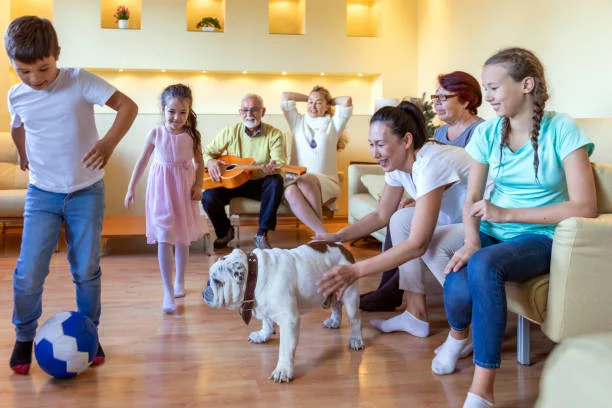Dog daycare can be a valuable support system throughout every stage of a dog’s life, from early puppyhood to the golden senior years. Just like humans, dogs have unique needs depending on their age and energy levels. A daycare environment that understands these stages can provide more than just a safe place to stay — it can support physical well-being, emotional growth, and social development. Whether you’re raising an energetic puppy, managing the strong-willed independence of an adult dog, or caring for a slower, older companion, a thoughtfully run dog daycare can make all the difference. We will explore how age-tailored care in a dog daycare setting enhances the quality of life and contributes to the lifelong health and happiness of our four-legged friends.
Don’t miss this next story—it’s packed with helpful info!
Tailoring Daycare to a Dog’s Life Stage
The Puppy Phase: Early Socialization and Boundaries
The early weeks and months of a puppy’s life are formative. Between the ages of 8 weeks and 6 months, puppies are like sponges, absorbing their environment and learning critical behaviors that shape them into balanced adult dogs. At this stage, dog daycare plays a crucial role in socialization. When a puppy regularly interacts with other dogs, they learn how to read body language, respect boundaries, and respond to different personalities. This helps prevent future behavioral problems. At a dog daycare facility like Ruffgers Dog University in Naples, a young puppy is not just thrown into the mix; they are introduced gradually in a controlled setting where they meet calm, well-mannered adult dogs and other puppies under careful supervision.
In addition to socialization, puppies require a structured and routine environment. Frequent potty breaks, rest periods, and short playtimes designed to match their stamina help them develop trust and stability. Puppies thrive on mental stimulation, so activities like simple obedience games, soft-chew toys, and guided play can help teach them patience and focus. A daycare that understands the sensitive nature of puppy development offers a balance of calm and play, ensuring a puppy isn’t overwhelmed. In short, daycare in the puppy stage is not just helpful for working owners — it’s a foundation builder for a well-adjusted, sociable adult dog.
Adolescents and Young Adults: Channeling Energy Productively
Once a dog hits the 6-month mark, energy levels can skyrocket, especially in high-drive breeds. Adolescent dogs between 6 months and 2 years are curious, mischievous, and full of physical stamina. This is often the time when owners begin to notice challenging behaviors, such as chewing, jumping, or general restlessness. Daycare at this stage of life provides an essential outlet. Rather than leaving a dog home alone to create their entertainment (often at the expense of your furniture), dog daycare offers structured activities to burn off energy and encourage good behavior.
For these high-energy dogs, daily routines that include agility-style courses, mentally stimulating puzzles, fetch sessions, and basic training refreshers keep both their minds and bodies engaged. Importantly, this age group also benefits from rules. In a group play setting, dogs learn that rough play has limits and that cooperation earns them longer playtime. Being in daycare also curbs separation anxiety, which often peaks during adolescence. Knowing they have a fun, familiar place to go during the day gives dogs a sense of belonging and consistency, which is vital as they grow into adulthood. Ruffgers Dog University offers enrichment in an academic-style environment — ideal for the teenage dog that needs both fun and focus.
Adulthood: Maintaining Balance and Social Confidence
As dogs mature, they settle into adult routines, typically between the ages of 2 and 7 years. While they might not be as hyperactive as their adolescent selves, adult dogs still require daily mental and physical stimulation. Many owners fall into the trap of thinking an adult dog is “low maintenance,” but a lack of regular interaction and exercise can lead to boredom, weight gain, or behavior regression. A daycare program specifically designed for adult dogs helps keep them active and engaged.
At this stage, dogs often have well-established play styles and social preferences. Some may enjoy wrestling with a close friend, while others prefer parallel play or solo toy time. A quality daycare recognizes these differences and groups dogs accordingly. Daycare can also help maintain social skills. Even if a dog doesn’t live with other pets, seeing familiar canine faces during the week reinforces healthy pack behavior and keeps social skills fresh. For many adult dogs, daycare becomes a happy part of their weekly rhythm — a time to play, explore, and interact in a space that’s both familiar and exciting. Structured downtime in quiet rooms also gives them the opportunity to rest, preventing overstimulation and supporting long-term behavioral health.
Dog daycare is not a one-size-fits-all solution — it evolves as your dog grows, changes, and matures. From the social needs of puppies to the mental stimulation required by adolescents, from the balanced lifestyle of adult dogs to the gentle support seniors deserve, daycare can be a consistent, beneficial part of your dog’s life journey. Facilities that understand the nuances of each life stage provide more than just a place to drop off your pet. They offer community, learning, comfort, and joy tailored to your dog’s life stage. By investing in age-appropriate care and structure, owners can give their dogs healthier days, richer relationships, and more fulfilling lives — every step of the way.
If you enjoyed this post, you’ll love what’s featured on 2A Magazine.







